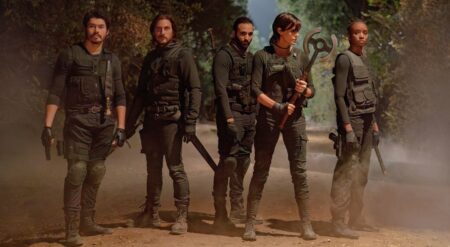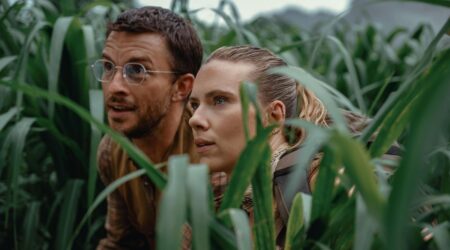
Content Warning: This review contains frank discussion of sexual assault.
Documentary filmmakers Parker Hill and Isabel Bethencourt chronicle the pains of adolescence and the, sometimes unwilling, transition from girlhood to womanhood in Cusp. Set in a small town in the Texas Hill Country, Cusp follows the lives of three teenage girls as they navigate heartbreaks, formative moments, and loss of innocence in a space that offers little more than pasture parties and trips to McDonald’s. In short, Cusp is a heartbreaking testament to the resiliency of young women.
Cusp struck me, as a viewer, on an extremely personal note because it was filmed in a town not far from where I grew up. Though the filmmakers protected their minor subjects by omitting certain details of their identities, several scenes in the film were instantly recognizable to me. In watching, and now writing about, the film the intimacy of shared space does more than allow me to judge how well the directors capture life in these small Texas towns. This personal connection sent me deep back into my own memories of what it was like to be a teenage girl in a small town. What it was like to be losing your innocence in a place that felt so oppressively small.
The central theme of Cusp is the loss of innocence. Something about the big screen makes teenage girls seem even younger than they are. At moments, one can watch these girls and warmly remember slumber parties and the small problem of not knowing what to wear to a party. The next moment this child speaks candidly about losing a court case to her molester, or the first time a boy pressured her to have sex. It sucks the air out of your body, as a viewer, to watch this strange balance of childhood and womanhood teeter along a line of nipple piercings and sneaking out. It’s a sad truth that most women can remember the first time their teen bodies were sexualized by an adult just as easily as they remember when their first period arrived. These girls are being forced to grow up before their time and it’s so painful to watch.
Hill and Bethencourt brilliantly execute a film that weaves a tapestry of girlhood, class issues, and a raw portrait of life in these rural communities. The amount of trust and openness shown by their subjects allows each of these attributes to be presented boldly and honestly. Again I must draw upon my own experiences growing up in these Hill Country towns, I went to school with young girls that were the same as the girls of Cusp. It is a weight on the film to be watching this exploration unfold, already knowing how many of the young women I knew ended up. Just as much as I was taken in by the thoughtful and thorough filmmaking, it’s nearly impossible to watch Cusp without whispering a prayer that these girls come out the other side okay. That they make it.
The mark of a great documentary is to allow your audience a complete look at a small window of the world. Cusp approaches its space and subjects with total awareness, mastery, and sensitivity. It is a difficult film to watch, but it is essential. Hill and Bethencourt manage to squeeze every drop of joy and hope out of life’s most grim realities.
Cusp premiered on January 30 at the 2021 Sundance Film Festival as part of the U.S. Documentary competition.
Cusp
-
Rating - 7/107/10
TL;DR
The mark of a great documentary is to allow your audience a complete look at a small window of the world. Cusp approaches its space and subjects with total awareness, mastery, and sensitivity. It is a difficult film to watch, but it is essential. Hill and Bethencourt manage to squeeze every drop of joy and hope out of life’s most grim realities.






